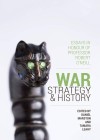War, Strategy and History. Essays in honour of Professor Robert O’Neill
Edited by: Daniel Marston and Tamara Leahy,
ANU Press, 2016,
ISBN: 9781760460235, 312 pp,
Reviewed by: Lieutenant Colonel Mark O’Neill
War, Strategy and History is an apt title for this Festschrift honouring the influential career of soldier, strategist and historian, Professor Robert (‘Bob’) O’Neill. From Intelligence Officer of the 5th Battalion, Royal Australian Regiment (5 RAR) in South Vietnam in 1966–67; to involvement with the International Institute for Strategic Studies (IISS); to Oxford Chair of the History of War, plus many other appointments, this book captures the life’s work of a great Australian.
Bob O’Neill was a Duntroon graduate and Rhodes Scholar prior to his service in Vietnam with 5 RAR. Grounded in these formative experiences, his career subsequently took a path arguably unmatched by any other Australian soldier–scholar before or since. The editors tell the story through a series of essays written by people who worked with Bob over fifty years of intellectual endeavour and contribution.
Sir Michael Howard sets the scene for Bob’s abilities early in the book’s foreword. He writes of approaching the young Rhodes Scholar to fill a gap in a volume he was editing on Sir Basil Liddell Hart:
…Captain Robert O’Neill produced, bang on time, a superb contribution that more than held its own in the company of those by, among others, Andre Beaufre, Henry Kissinger, Yigal Allon and Alastair Buchan.
Amongst the contributing writers to this book are Sir Lawrence Freedman, Paul Dibb, Allan Gyngell, Beatrice Heuser, John Nagl and John Hillen. All significant writers and thinkers in their own right; their contributions reflect the respect people have for Bob’s work and his long record of mentorship and teaching.
The book successfully incorporates several themes. As a biographical piece, it comprehensively charts the work and influence, arguably, of Australia’s greatest strategic studies polymath. The editors have done good work in managing the tone across the various authors, and a very interesting and readable biography emerges. But the book is more than biographic. It effectively charts the development of big issues in the field broadly labelled ‘strategic studies’ over the last 50 years. From the counter-insurgency wars of the cold war, through to nuclear arms control and disarmament, the development of contemporary think-tanks and back to the wars of the present, Bob O’Neill’s presence and contribution emerges. For this reason alone, the book should be of significant interest to students of strategic policy development.
The final theme that emerges in the book is one of leadership—whether policy leadership, institutional leadership or teaching and mentorship—this enduring aspect of Bob’s work is consistently emphasised by the authors. Many acknowledge a debt of gratitude for his efforts. Readers of this journal will find an inspirational example, upon which to reflect, of life-long leadership across multi-disciplinary teams.
In War, Strategy and History Daniel Marston and Tamara Leahy have produced a well-written, interesting and worthy record of the career and times of Professor O’Neill. I recommend it to students of history, strategic policy and leadership and those interested in biography of notable Australians.

